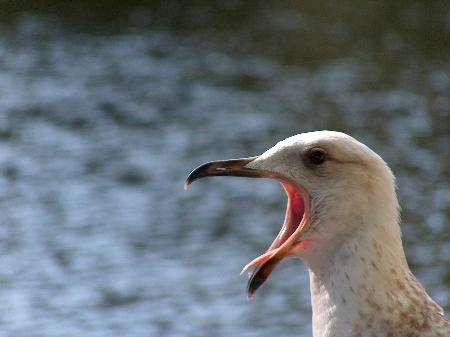Combating the rise of the urban gull

Academics and students from the University of the West of England (UWE Bristol) have begun a unique project studying the interaction between humans and urban gulls. A team of psychology undergraduates will monitor the birds in Bath and North East Somerset to gather information about nesting sites, feeding behaviours, and the human response to the gulls in an 18 month research assignment.
Their research could be used to support the work of national experts who are developing new ideas for combating the expanding urban gull population. The surge in numbers is driving an increase in complaints from residents over noise, excrement and aggressive behaviour, placing a strain on local authorities across the country.
Dr Chris Pawson, who is leading the project on behalf of the university, says existing measures used to control the gull population over the past decade or so have been largely ineffective. He believes a better understanding of the motivations of the protected species is required to formulate a fresh approach.
Working alongside Bath and North East Somerset Council, the students will work with Dr Pawson to plot data – including information about complaints from residents - on sophisticated maps and identify patterns which could help explain the way the birds behave.
Dr Pawson, head of psychology at UWE Bristol, said, "From a behavioural ecology point of view, many of the principles you call upon to explain human behaviour are exactly the same for wildlife.
"Humans make decisions based on the pressures of the environment around them. It just so happens that these gulls are finding the buildings and food available in Bath very comfortable. It is warm for them and there is little competition for food. Where would you rather be - on a cliff top somewhere, or on a nice ledge with ready food source?"
The leading expert on gulls in the Bristol and Bath area, Peter Rock, has long called for research to be carried out on the birds' behaviour. Both Dr Pawson and the Council hope to support Mr Rock's work.
Dr Pawson said: "A census of the gull population is frequently carried out in Bristol and Bath but, at the moment, there is so little understanding of the life history of these urban gulls.
"We need to know on what basis they are making their decisions and why they go to some areas and not others. By having these increased levels of data, ways we can shape their behaviour might emerge. We are open to all sorts of ideas.
"Interventions in Bristol or Bath have not, to date, significantly lowered the population of gulls. Current levels are such that complaints are intolerably high for the environmental teams and for the councils. Since I've been in Bath I have become acutely aware of the strain it is putting on local government, which is forever fielding complaints."
Residents in Bath will be invited to submit information digitally about gull activity in the city under a "citizen science" part of the research project, which will also involve Middlesex University.
Dr Pawson said: "This aim is to massively increase the amount of data we have access to. Residents will be able to tell us what they have seen and where they have seen it. It also means we can engage with the public about scientific research."
Councillor Martin Veal, Bath & North East Somerset Council's Cabinet Member for Community Services, said: "This research runs in parallel with our three-pronged approach to tackling the issue of gulls in the city. It is a mutually-beneficial research project that comes at no cost to the Council. There is very little existing research available on this subject and it will give us the opportunity to gather evidence at a scale that hasn't been possible before, providing a clear steer on future intervention work."
Provided by University of the West of England

















